Japan’s Upcoming Social Changes
Starting this October, Japan will implement groundbreaking reforms to its child allowance system and minimum wage, aiming to bolster support for families and improve the livelihoods of workers. These changes reflect a significant shift in government policy as the nation addresses its demographic challenges and rising living costs.

Enhancements in Child Allowances and Minimum Wage
As Japan prepares for a significant transformation in its social welfare policies, the government is set to implement new measures that will profoundly affect families and workers alike. Starting in October, two pivotal changes will be rolled out: the broader coverage of child allowances and a much-anticipated increase in the minimum wage.

Expanding Child Allowance Coverage
One of the most noteworthy changes is the Japanese government's decision to abolish income caps for households eligible for child allowances. This reform will expand the benefits to families with children from junior high school age up to high school age, significantly increasing the support available to parents during a crucial developmental stage in their children’s lives.
Previously, child allowances were capped for families earning above a certain threshold, limiting the benefits to a select group. However, the new system will now provide a safety net for more households, reflecting a shift in policy aimed at addressing the declining birthrate in Japan. By broadening the eligibility criteria, the government is signaling its commitment to support families and encourage higher birth rates.

Enhanced Benefits for Families
In addition to expanding coverage, the government plans to raise benefits for the third and subsequent children significantly. The new allowance will increase to 30,000 yen (approximately $208), a remarkable increase of two to threefold from previous amounts. Furthermore, the payment frequency will be doubled, increasing from three payments per year to six. This change will allow families to receive financial assistance more regularly, easing the burden of child-rearing costs throughout the year.
The implementation of these new benefits is expected to start with the December payments, covering the months of October and November. By providing increased financial support to families, the government aims to alleviate the financial pressures associated with raising children, thus fostering a more family-friendly environment in Japan.

Minimum Wage Hikes Across the Nation
In tandem with the child allowance reforms, Japan is also set to increase the minimum wage across all 47 prefectures. Starting in October, workers will see their minimum wage rise to a national weighted average of 1,055 yen, an increase of 51 yen from the previous year. This adjustment comes in response to rising living costs and an ongoing dialogue about fair compensation, which has gained momentum during the annual spring labor negotiations.

Regional Variations in Minimum Wage Increases
While the national government set a target increase of 50 yen, many rural prefectures have opted for more substantial raises due to concerns about population outflow and the need to attract workers. Notably, Tokushima Prefecture will implement an increase of 84 yen (approximately 58 cents), showcasing a proactive approach to addressing local economic challenges. In contrast, Tokyo, with a new minimum wage of 1,163 yen (around $8.07), will lead the pack alongside 15 other prefectures where the minimum wage exceeds 1,000 yen.
Conversely, Akita Prefecture will have the lowest minimum wage at 951 yen (approximately $6.60), highlighting the disparities in wage policies across the country. These adjustments reflect a broader strategy to create a more equitable labor market, ensuring that even low-income workers can meet basic living standards amid rising prices.

Inclusion of Part-Time Workers in Pension Plans
Another significant change set to take effect is the inclusion of part-time and short-time workers at companies with 51 to 100 employees in employee pension plans. Until now, eligibility for these plans was restricted to workers at companies with 101 or more employees. This shift acknowledges the growing importance of part-time employment in Japan's labor market and aims to provide better security for a segment of the workforce that has been traditionally marginalized.
To qualify for the pension plans, applicants must meet certain criteria: their working hours must range from 20 to 30 hours per week, they must earn at least 88,000 yen (approximately $610) monthly, and they cannot be students. This change not only bolsters financial security for part-time workers but also reflects the government's recognition of the diverse nature of employment in contemporary Japan.

COVID-19 Vaccination Program Resumes
Additionally, next month marks the beginning of the regular COVID-19 inoculation program targeting older populations. The government will subsidize municipalities to keep co-payments for these vaccinations at around 7,000 yen (approximately $48.57). For those under 65 without underlying conditions, voluntary inoculations will be available at their own expense. The annual vaccination drive aims to ensure widespread immunity, particularly among vulnerable populations, with plans for 32 million doses by the end of fiscal 2024.

A Significant Step Forward in Japan's Social Policy
The upcoming changes in child allowances and minimum wage, alongside pension plan inclusivity and vaccination initiatives, represent a significant step forward in Japan's social policy. These measures aim not only to support families but also to create a more equitable labor market in the face of rising living costs and demographic challenges. As these policies come into effect, they hold the potential to reshape the socioeconomic landscape of Japan, fostering a healthier, more inclusive society.
Find Cheap Flight Tickets to any Destinations in Japan and the Philippines
Nipino.com is committed to providing you with accurate and genuine content. Let us know your opinion by clicking HERE.






























































